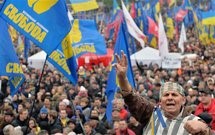 Whenever Russia and the West fight, China’s geopolitical leverage goes up. This trend, which stood the test of time for more than a century, is now playing out again in the deepening crisis in Ukraine. As Washington and Moscow squabble over Ukraine, both are reaching out to Beijing. China, unsurprisingly, is playing hard to get.
Whenever Russia and the West fight, China’s geopolitical leverage goes up. This trend, which stood the test of time for more than a century, is now playing out again in the deepening crisis in Ukraine. As Washington and Moscow squabble over Ukraine, both are reaching out to Beijing. China, unsurprisingly, is playing hard to get.
Chinese President Xi Jinping was among the first world leaders that Russian President Vladimir Putin called last week. When Moscow put out the word that China was in sync with Russia’s position on Ukraine, Beijing hinted, "not exactly". Sensing the gap in the positions of Beijing and Moscow, US President Barack Obama and German Chancellor Angela Merkel reached out to Xi this week. The Chinese president, of course, is neither endorsing Russia nor the West. He is calling for calm, restraint and a diplomatic solution.
Through the Great Game, a contest between Britain and Russia on the fringes of the subcontinent in the 19th and early 20th centuries, London often cut slack for Beijing, ignoring the advice of Calcutta and New Delhi. Although China was weak at the turn of the 20th century, London deferred to Beijing’s sensitivities in inner Asia, for example in Tibet. After a brief period of hostility with China in the early years of the Cold War, America quickly aligned with the Chinese communists against the Russian communists and took full advantage of the Sino-Soviet rift. This Western tilt towards China in the 1970s was one of the defining moments of the Cold War and set the stage for China’s integration with the global economy.
Over the last decade, China’s partnership with Russia has deepened and the two countries have cooperated in regional and global issues against the US. A widespread assumption was that Beijing’s current distrust of the West might move it closer to Russia on Ukraine. On the other hand, Beijing’s opposition to intervention in the internal affairs of other countries and its growing economic stakes in Ukraine underlined China’s discomfort with Russia’s attempt to detach Crimea from Kiev. Yet, Beijing has been unwilling to criticise Moscow in public.
China may have reasons to be relieved if a Cold War-like situation re-emerges in Europe and American attention is drawn away from Asia. When George W. Bush was elected US president in 2000, his initial focus was on limiting Chinese power in Asia. As America plunged into two prolonged wars in Afghanistan and Iraq after the events of 9/11, China had the time and space to build its comprehensive national power.
Japan’s dilemma
If China is carefully nurturing its leverage with both America and Russia, Japan finds itself between a rock and a hard place. As a longstanding ally of the US, Tokyo might have been expected to criticise Russian actions in Ukraine. But Tokyo is choosing its words carefully. It does not want to antagonise its most important partner, America, but is also unwilling to offend Russia, which has become a major foreign policy priority for Japan. Tokyo today believes that the real and present danger to its national security comes from China. Any national strategy of balancing Beijing, Tokyo has calculated, must involve closer ties with Moscow.
Since he came to power at the end of 2012, Japanese Premier Shinzo Abe has met five times with Putin, more than any other international leader. Abe has fast-tracked negotiations on the territorial dispute with Russia, outlined an ambitious agenda for economic cooperation and initiated high-level defence dialogue. Abe will be praying for an early resolution to the crisis in Ukraine that will save the face of Putin and Obama and leave enough space for Tokyo to deepen ties with Russia.
Singapore’s realism
As China and Japan ponder the complex geopolitical implications of the crisis in Ukraine, Singapore, the city state, has simplified the narrative on the implications of the unfolding European crisis for Asia. Singapore Prime Minister Lee Hsien Loong argued that small countries must not depend only on multilateral arrangements or promises from big powers for their national security. Singapore, Lee insisted, must always maintain strong armed forces as well as a capable diplomatic corps to strengthen the nation’s position in the world. The lesson drawn by Lee is applicable to not only small countries but also most middle powers in Asia, who must now confront the destabilising impact of renewed tensions among the great powers.
By Special Arrangement with : Observer Research Foundation (www.orfonline.org)